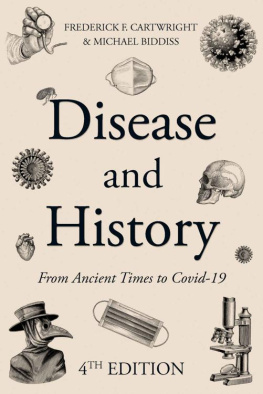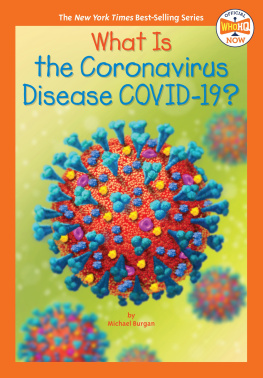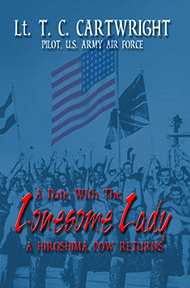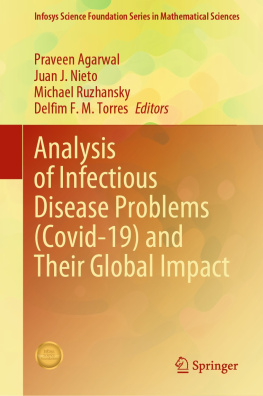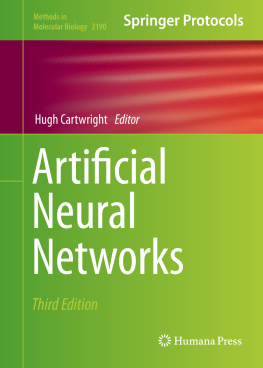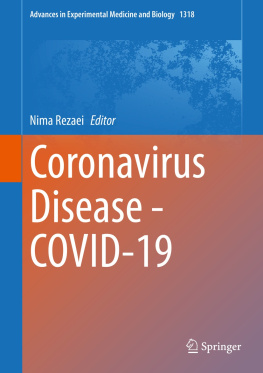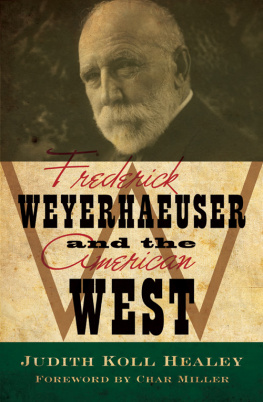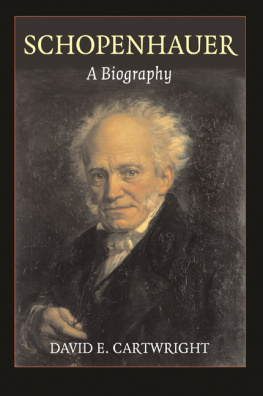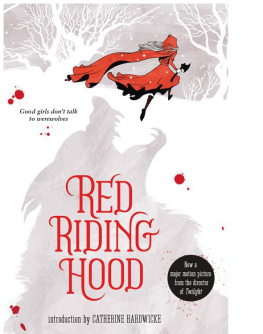Frederick F. Cartwright - Disease & History: From ancient times to Covid-19
Here you can read online Frederick F. Cartwright - Disease & History: From ancient times to Covid-19 full text of the book (entire story) in english for free. Download pdf and epub, get meaning, cover and reviews about this ebook. year: 2020, publisher: Lume Books, genre: History. Description of the work, (preface) as well as reviews are available. Best literature library LitArk.com created for fans of good reading and offers a wide selection of genres:
Romance novel
Science fiction
Adventure
Detective
Science
History
Home and family
Prose
Art
Politics
Computer
Non-fiction
Religion
Business
Children
Humor
Choose a favorite category and find really read worthwhile books. Enjoy immersion in the world of imagination, feel the emotions of the characters or learn something new for yourself, make an fascinating discovery.
- Book:Disease & History: From ancient times to Covid-19
- Author:
- Publisher:Lume Books
- Genre:
- Year:2020
- Rating:3 / 5
- Favourites:Add to favourites
- Your mark:
- 60
- 1
- 2
- 3
- 4
- 5
Disease & History: From ancient times to Covid-19: summary, description and annotation
We offer to read an annotation, description, summary or preface (depends on what the author of the book "Disease & History: From ancient times to Covid-19" wrote himself). If you haven't found the necessary information about the book — write in the comments, we will try to find it.
Disease & History: From ancient times to Covid-19 — read online for free the complete book (whole text) full work
Below is the text of the book, divided by pages. System saving the place of the last page read, allows you to conveniently read the book "Disease & History: From ancient times to Covid-19" online for free, without having to search again every time where you left off. Put a bookmark, and you can go to the page where you finished reading at any time.
Font size:
Interval:
Bookmark:
Disease and History:
From Ancient Times to Covid-19
By
Frederick F. Cartwright & Michael Biddiss
First published by Rupert Hart-Davis, 1972
Second Edition, 2000
Third Edition, 2014
Copyright Frederick F. Cartwright & Michael Biddiss
This Fourth Edition published in 2020 by Lume Books
30 Great Guildford Street,
Borough, SE1 0HS
The right of Frederick F. Cartwright & Michael Biddiss to be identified as the authors of this work has been asserted by them in accordance with the Copyright, Design and Patents Act, 1988.
All rights reserved. No part of this publication may be reproduced, stored in a retrieval system, or transmitted in photocopying, recording or otherwise, without the prior permission of the copyright owner.
CONTENTS
Preface
Introduction: Disease and History
1 Disease in the Ancient World
2 The Black Death
3 The Mystery of Syphilis
4 Smallpox, or the Conqueror Conquered
5 General Napoleon and General Typhus
6 Cholera and Sanitary Reform
7 Gin, Flu, and Tuberculosis
8 Mosquitoes, Flies, Travel, and Exploration
9 Queen Victoria and the Fall of the Russian Monarchy
10 Mob Hysteria and Mass Suggestion
11 Current Problems of Survival
Epilogue: The Covid-19 Pandemic
Further Reading
PREFACE
This book had its origins in debate and collaboration between a doctor and a historian, each concerned to provide the general reader with an accessible account of some of the principal ways in which disease has often made a dramatic mark upon history.
The first edition was published in 1972, after which it received various reprintings and was also translated into French and Japanese. An enlarged and fully revised second edition then appeared in 2000, and subsequently became the object of a still wider range of foreign translations. By the time that I undertook some further updating for a paperback version issued four years later, my co-author Frederick Cartwright had died at the end of a very long and distinguished career not only as a consultant anaesthetist but also as a pioneering writer and teacher on topics related to the development of medical ideas and practice. A further edition of the book appeared in 2014, ending with my substantially enlarged treatment of topics that flow from the past into major issues of current and future concern. I am grateful to Andrew Lownie for having now encouraged me to prepare a fourth edition, reinforcing such analysis with a new and particularly topical Epilogue. This assesses, as far as is currently possible in the midst of swiftly changing circumstances, the nature and historical significance of the Covid-19 pandemic which began to develop so rapidly in the course of 2020.
In preparing the present edition I have again enjoyed the benefit of dialogue with Dr James Willis. His medical knowledge and wisdom stem from extensive experience in general practice, and I am most appreciative of the helpful comments that he has continued to make in precisely the same spirit of inter-disciplinary collaboration as originally inspired Disease and History. Further warm thanks for assistance in preparing this updated version are due to Louise Dilloway and Lesley Willis, as well as to James Faktor and his colleagues at Lume Books.
MICHAEL BIDDISS
November 2020
INTRODUCTION
DISEASE AND HISTORY
Historians and doctors have much in common, sharing particularly an interest in the influences which condition human existence. The object of this book is to study the area in which those interests most directly converge, that of the impact of disease upon history. In medical diagnosis a single cause for disease will often be found; in historical investigation the causes are likely to be more complex. Nothing could be more ridiculous than to contend that disease is always the primary cause of a great historical change but, particularly at a time when the sociological aspects of history are being increasingly emphasized, it is worth examining episodes in which the influence of disease may have been of real importance, especially when that significance has been neglected or misconstrued.
Our aim in studying some of the many maladies which have afflicted the world will be to illustrate their effect not only upon historically important individuals but also upon peoples. Thus the study is relevant to History, whether conceived as a saga of great figures or as the story of social conditions and broader human development. The ills that have plagued civilized societies are as much a part of civilization as are their prevention and cure. If disease itself is historically important, then the conquest of disease is no less so. And, as we shall see, this conquest, though still only partial, has itself raised problems that are no less daunting and equally relevant to our subject.
The picture of primitive human beings isolated in their caves is misleading. The family unit developed into the tribe living a communal life. These small communities, a few of which still exist in remote jungle areas today, dwelt in man-made clearings with little or no contact between individual settlements. Each group was self-supporting, dependent upon naturally occurring food sources. In Central Africa, for instance, bananas and manioc formed a staple diet, varied by small quantities of palm oil and only rarely by human or animal flesh. The few enemies of these tribal communities were snakes, carnivorous beasts and pygmy humans who shot at them with strophanthin-poisoned arrows. Puerperal fever in childbirth, a high infant mortality and endemic disease, such as sleeping sickness and yaws, prevented rapid increase in population. Life span was short, partly because no reliable cure for illness existed, partly because a high carbohydrate diet led to early obesity with fatty infiltration of the vital organs. So tribal growth remained almost static, increasing in a healthy season when live births outnumbered deaths, decreasing when infant mortality was high. Such is the natural process of slow increase in a primitive community which is adequately fed and protected from major disaster but cannot cope with the hazards of childbirth and sickness.
Disaster in the form of famine, war or epidemic disease could strike only from outside. A plague of insects might descend upon the crops and cause famine. Arab slavers, pushing down from the north and east of Africa, might chance upon one of these villages, engage the inhabitants in battle and carry off the survivors into captivity. In later years Europeans would come, bringing with them new diseases relatively harmless to themselves but lethal to a community lacking any inbred or acquired resistance.
When thousands of years ago the peoples that would eventually create the great civilizations of Egypt, Mesopotamia, India and China began to emerge from self-contained communities the chances of major disaster multiplied. A greater degree of civilization brought benefits, including a higher standard of living and a fuller intellectual life, but it also produced hazards. As mobility increased so too did the likelihood of contact with unknown diseases. Tracks became roads that made for easier and faster travel. New diseases could be carried along such routes, striking down unaccustomed populations before resistance to the invading organisms could develop. Cities were built and, as city-dwellers necessarily rely upon an extraneous food supply, famine became inevitable whenever that supply failed, for there were no natural resources to take its place. Hunger, the desire for more and better living space, or the simple lust of a chieftain for power, would then set one grouping to fight against another. So mankinds three great enemies, Pestilence, Famine and War the three Horsemen of the Apocalypse who bring in their train Death upon his Pale Horse developed on an ever-increasing scale.
Next pageFont size:
Interval:
Bookmark:
Similar books «Disease & History: From ancient times to Covid-19»
Look at similar books to Disease & History: From ancient times to Covid-19. We have selected literature similar in name and meaning in the hope of providing readers with more options to find new, interesting, not yet read works.
Discussion, reviews of the book Disease & History: From ancient times to Covid-19 and just readers' own opinions. Leave your comments, write what you think about the work, its meaning or the main characters. Specify what exactly you liked and what you didn't like, and why you think so.

